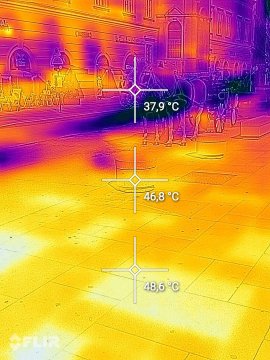
Horse-drawn carriages
An end to the trade
Everyday life for the Fiaker (carriage) horses is cruel and VGT has been campaigning for many years, achieving incremental improvements on the way to the goal of an end to the trade. Although horses are flight animals, Fiaker horses are made to take tourists around the centre of the hectic city, full of noise and exhaust fumes on hard and, in winter, often slippery asphalt roads. Their stabling is usually a loose box without any access to a field or paddock. Many of the stables are in a terrible condition.
Horses may be steppe animalsbut in the city, they struggle with the heat nevertheless. In this environment, high summer temperatures are further exacerbated by additional heat radiating from roads and buildings. At many of the stands, where the horses wait for tourists, there is little or no shade. They are made to wear 'poo bags', muzzles and blinkers, all resulting in a restriction to their freedom of movement. Indeed, freedom of movement is a major welfare issue with Fiaker horses, as unless daily access to a field or paddock is ensured they are either harnessed to a carriage or standing in a loose box all the time. These horses are unable to carry out their natural behavious and suffer as a result, often developing stereotypical and aggressive behaviours. Another major problem with this trade is presented by the frequent traffic accidents involving Fiaker horses, drivers and pedestrians. This video details accidents that took place in Austria between 2002 and 2018. Sadly since then, the list has only continued to get longer.
Accident video (German)
Campaign successes so far include the implementation of regular official inspections by government vets, a ban on the tethering of horses while stabled, tighter restrictions on working hours and a working temperature limit of 35° C. A reduction in this working temperature continues to be a priority for us and happily, the city of Salzburg made the ruling in 2020 that horses are not allowed to work in temperatures over 30° C. This was implemented in 2021.
 The use of thermal imaging cameras has enabled us to highlight how misleading the current procedure for establishing the temperature measurement is, as can be seen in this picture.
The use of thermal imaging cameras has enabled us to highlight how misleading the current procedure for establishing the temperature measurement is, as can be seen in this picture.While the official reference thermometer still shows 32 °C, the ground on Vienna's St. Stephen's Square has already heated up to 49 °C under the horses' hooves and the air temperature is already 37.9 °C.
Thankfully, a large number of cities worldwide have already banned horse-drawn carriages, including London, Oxford, Paris, Beijing, Toronto and the Turkish tourist destinations of Antalya and Izmir. Italy has ruled that in the future, horse-drawn carriages may only be used in green areas and no longer in traffic.
And other countries are also setting a good example: In Rome and Berlin, Fiaker horses now have a working temperature limit of 30° C.
Please help us to also achieve a 30° C working limit for the carriage horses here in Austria as well as shade at all stands, a ban on muzzles and daily access to a paddock or field.
English text below.
Petition text in full
To the Vienna City Government: PETITION: Working maximum temperature limit of 30° C. The everyday life of carriage horses is cruel. These are flight animals made to work in the middle of the city under the stress of noise and exhaust fumes on hard asphalt. Their stabling is usually a loosebox without adequate access to a field or paddock. Often stabling is in very poor condition. Whilst horses are steppe animals, excessive heat in the urban environment radiated from streets and buildings puts them under significant stress. Since 2016 there has been a maximum working temperature limit of 35° C, but the negative impact is already very high from 30 degrees. In their natural environment, horses retreat into a cooler, shadier areas, but in the city, many of the stands have no shade at all. Since horses are flight animals, some horses develop behavioural problems as a result of their stressful environment. They bite passers-by or their fellow horses. Owners often try to prevent this with a muzzle. However, this only causes further problems, making breathing more difficult for the and further restricting their social behaviour. Horses must be allowed daily access to a paddock or field to compenstate for restrictions resulting from being harnessed to to carriages.
The undersigned demand of the Viennese city government:
- Maximum working temperature limit of 30° C
- Shade on all stands
- Ban on muzzles
- Ban on muzzles
- Ban on tail-high-binding
- Daily tuen out to pasture
 Association against
Association against